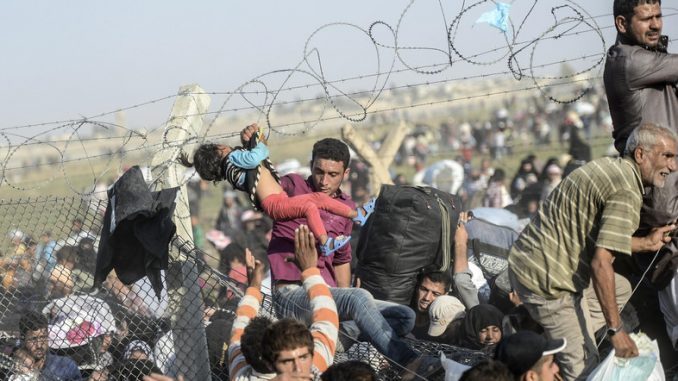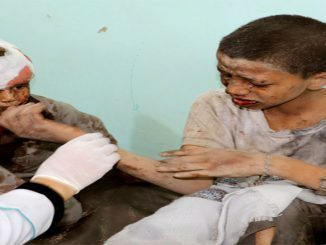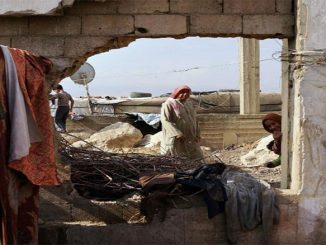
Eight children have died in Rukban camp this month, as families blame terrible living conditions and lack of humanitarian aid for their deaths
Clutching her young baby to her chest to warm her up during one of many freezing nights that Syria’s Rukban refugee camp has had to endure this winter, Samah al-Awwad unwittingly fell asleep.
When she woke with the sunrise, the bundle between her arms had turned cold.
“It was one of those dark, freezing nights when my Yasmeen was sleeping in my arms. There should be nowhere warmer than on my chest but it was cold even there,” said Samah, 33, choking on her words as she relived the moment.
“I don’t know how I fell asleep, but when I woke up at sunrise I felt a coldness between my hands, where my baby was. She was supposed to be warm.”
Yasmeen was born a month-and-a-half earlier in the neglected camp, located in a demilitarised zone of southeastern Syria near the Jordan border, just as it was enveloped by a hostile winter.
More than half of the 15 Syrian children who have died in refugee camps in Syria and Lebanon this winter lived in Rukban, an impoverished settlement of at least 40,000 internally displaced Syrians, according to the World Health Organisation (WHO).
When Samah got pregnant almost a year ago, she and her husband Masoud were hoping they would either be able to return to their home by the time Yasmeen was born, or be allowed to leave the camp for a hospital. Neither happened.
The couple had spent weeks trying to get Yasmeen through the winter, sleeping in shifts to ensure they could tend to the illnesses she had suffered since her difficult birth.
The delivery almost killed both mother and child and left Samah in a 24-hour coma. She puts her survival down to the “miraculous” work of a camp midwife. The camp had no incubator to keep the frail newborn in.
“Health care facilities are barely functioning and have very few staff or medical supplies. There are no generators or fuel to provide even minimum warmth to alleviate the bitterly cold weather,” WHO said in a statement on 17 January.
The organisation urged for it to be given access to the camp, where it said diseases and illnesses linked to the cold are especially dangerous for young children.
Similar conditions led to Saqr and Fadilah al-Mouawad losing their daughter Basma, who at three-and-a-half months old was barely older than Yasmeen.
Basma made it through a difficult delivery but was malnourished and the aid supplies available in Rukban were not enough to sustain her.
Her parents said she should never should have been born in Rukban anyway.
“Before Basma’s delivery we were trying to leave the camp, but it’s unbelievable how strict things have become,” Saqr told MEE. He said he tried to supplement the aid supplies with whatever he could buy from traders inside the camp.
“I talked with camp officials, with many UN employees who come for food distribution, about helping us out, but [I was given] only lies and promises that weren’t fulfilled.”
Talks to dismantle Rukban
In November, a convoy of 70 trucks delivered the first UN aid supply to the camp since January last year.
To access a basic clinic, residents must cross into Jordan – through a border that has been largely closed since 2016.
Those at the camp began arriving in late 2015, after fleeing areas of Syria previously controlled by the Islamic State (IS) group.
They wanted to cross into Jordan, which has taken in 670,000 Syrian refugees since the civil war began in 2011, but the kingdom sealed the crossing at Rukban in June 2016 after seven Jordanian border patrol soldiers were killed in a bomb attack claimed by IS.
Jordan announced earlier this month that it was holding three-party talks with Russia and the US aimed at dismantling Rukban, arguing that the conditions are right for the refugees to return home.
However, residents of the camp have said they fear reprisals or conscription if they are forced to go back to government-held territory.
Abdul Aziz Aghani, a 46-year-old history teacher in Rukban, said all of the camp’s facilities were basic, with schools nothing more than tents furnished with a small board for him to write on.
Storms have forced the schools to close and left some of the students homeless once again.
‘Trashy, remote prison’
“What should be done to end this tragedy is to finally give everyone the right to move, or move everyone to northern Syria, not force everyone to stay in this trashy, remote prison,” Aghani told MEE.
“We call everyone responsible to look at our children who are about to die from lack of medicine or food. How is this possible in the 21st century?
“Every family can barely feed their children once a day – some only have one meal every two days, sadly,” he added. “As teachers, it is the same for us. We can’t help ourselves, let alone the poor, starving kids.”
Since her daughter’s death, Fadilah has now focused on supporting her two older sons, Mohammed and Khaled. “Both are struggling from lack of food and weak immune systems. They are skinny and barely have anything to eat,” Fadilah said.
“My beloved daughter Basma should have had a warm room and enough milk, but none of that existed,” she added. “I woke up and she was a cold thing wrapped in her baby blanket.
“May God rest her innocent soul.”



